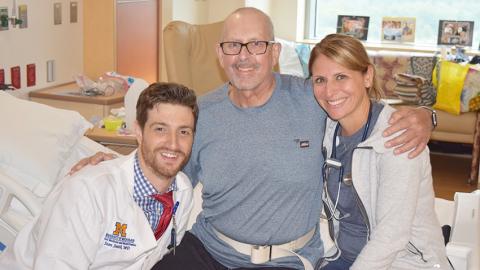
Mobile Cancer Rehab Program Helps Patients Get Stronger
The odds were stacked against Michael Champion.
The 65-year-old was diagnosed with acute lymphocytic leukemia, a disease that requires aggressive chemotherapy designed with much younger patients in mind.
Thanks to a new cancer rehabilitation program at the University of Michigan Rogel Cancer Center, Champion was able to recover from the debilitating effects of treatment and gain enough strength to resume life at home with his family.
The Mobile Comprehensive Oncology Rehabilitation Evaluation program, or MCORE, was created by Michigan Medicine’s Department of Physical Medicine and Rehabilitation to provide a more aggressive physical rehabilitation for cancer patients.
The goal: to decrease the length of a patient’s stay in the hospital.
MCORE has been vital for Champion, whose aggressive chemotherapy sapped his energy, strength and mobility.
“It was a blessing in a sense that he was healthy, so they said we can really slam this, but then as you get more and more chemo, we were not prepared,” says Champion’s wife, Pat.
It’s a common sentiment that inspired Sean Smith, M.D., Champion's rehabilitation medicine physician, to launch the program.
"People going through chemo or just having finished a cycle are some of the most fatigued people we get up here," Smith says.
Energy crisis
The path that led Champion from working out at his local gym in Kalamazoo, Michigan, and staying active with his family to celebrating the small victories of sitting upright and walking on his own began in December 2017.
The retiree noticed a drop in energy levels and blood blisters inside his mouth.
His doctors referred him to the Rogel Cancer Center, where a diagnosis was made. Champion began chemotherapy treatments at a hospital near home as well as at Rogel.
But his health began to decline from side effects. By June 2018, he was so weak his family knew additional help was needed.
"We could see the cumulative effect of all of this," Pat Champion says. "I kept saying he shouldn’t be at home. It's not safe."
Soon after, Michael Champion was moved to the inpatient rehabilitation unit at the end of the month to begin his journey back to full strength.


